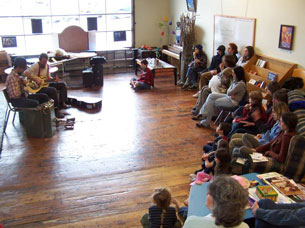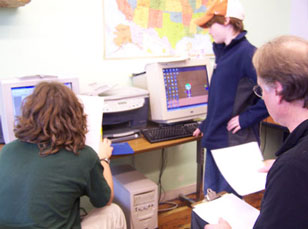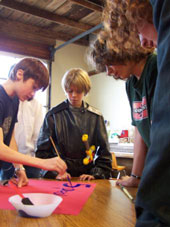
Classrooms
 We value the experience of working and playing in a multi-age
community. The community welcomes and seeks out the participation
of any-age persons who want to join us in our programs. We are
especially interested in the sharing of knowledge, skills and
expertise and encourage people in the larger Bellingham community
to talk to us about their interests. If
you would like to share your own experience and skills with our
community, please contact us.
We value the experience of working and playing in a multi-age
community. The community welcomes and seeks out the participation
of any-age persons who want to join us in our programs. We are
especially interested in the sharing of knowledge, skills and
expertise and encourage people in the larger Bellingham community
to talk to us about their interests. If
you would like to share your own experience and skills with our
community, please contact us.
In addition to our commitment that children have a firm base of
academic knowledge, we are ever conscious of the need for balance
and choices -- between academic and non-academic opportunities,
between individual and group efforts, between structured and un-structured
time.Balance and choices are enhanced through an assortment of
instruction (led by adults or children); student interest-driven
projects; thematic and experiential learning; after-school clubs,
e.g. math, arts & crafts, homework, foreign language, or music
clubs; individually-paced study; small group work; free choice
times and community service.
Three
multi-age classrooms (ages 4-14) each have seven to twelve students.
These age categories are not exclusive, however.For example, a
six-year-old who feels comfortable with older children and is
sufficiently advanced socially and academically to fit into the
7-9 age grouping, could be admitted to that classroom; or a 'just-turned
10-year-old' might be better served to be with the 7-9 year olds.
These decisions will be made jointly by the staff and the family
applying to the program.While these classrooms function as primary
learning groups, there will be abundant opportunities for interaction
among the classrooms as well as for community-wide functions and
activities. The possibilities for inter-classroom participation
include tutoring or general assistance offered from one class
or student to another; classes conducted by children or adults
which are open to any age learner; and general invitations to
join various projects.
Academic Curriculum
 We
provide an environment of encouragement and support for learners
to challenge themselves. In all age groups we offer core instruction,
activities and projects for math, science, fine arts, language
arts, history/social studies/geography and research and presentation
skills. Each student is supported to become competent in all academic
areas. Staff members pay close attention to differences in learning
styles, offer tutoring or mentoring where needed, and encourage
students to do more than they think they can do.
We
provide an environment of encouragement and support for learners
to challenge themselves. In all age groups we offer core instruction,
activities and projects for math, science, fine arts, language
arts, history/social studies/geography and research and presentation
skills. Each student is supported to become competent in all academic
areas. Staff members pay close attention to differences in learning
styles, offer tutoring or mentoring where needed, and encourage
students to do more than they think they can do.
Projects
 We
believe that projects, when designed from the interests, capacities,
and resources of the learners, are a wonderful way to learn. A
good project has a few essential elements:
We
believe that projects, when designed from the interests, capacities,
and resources of the learners, are a wonderful way to learn. A
good project has a few essential elements:
* Brainstorming
sessions at the beginning
* A planning and hypothesizing stage
* Information/resource gathering and sharing
* Revising project to focus and expand ideas
* Experimenting, clarifying and cooperating to display ideas
Adults
act as facilitators during the projects, not designers or directors.
It can be extremely valuable for children to be free to make mistakes
without an adult trying to take over. We can be especially helpful
by supporting the motivation of the children, and can do a lot
by simply being attentive and available.Classroom staff help learners
design and plan projects which present the opportunity for breadth
and depth in their program studies. Math and science often lend
themselves to interesting and learning-rich projects. Social studies,
history, geography and local or regional physical science blend
well into projects that generate connections, infusing the investigation
with personal meaning for the learner. And, of course, the expression
and presentation of the results of our investigation require effective
writing and organization, and often effective speaking, computer
skills, and the artistic representation of new-found understanding.
A project might entail the study of a particular place, people,
and time period including religions/beliefs; predominant industries;
arts and crafts; food and customs; inventions; politics and physical
locale. A group of learners might decide to cover several of these
areas, and individuals might want to focus on one as an independent
investigation.Another project might be the planning and construction
of buildings, machines or inventions; or research into how place
affects our lives -- in house construction, clothes, foods and
life style. Other individual and group explorations into various
and sundry interests of the students might evolve --the design
and creation of a mural for our building, gardening for a local
food bank, mastering a computer software program, writing/compiling
a book of poetry or drawings, or creating a board, computer or
card game. Much of the indoor work for projects will be conducted
in common areas such as the library, community space or the art
studio. Many aspects of a topic can be pursued at our Outdoor
Learning Center. For any project underway, children from any classroom
with a strong interest in the focus of that particular undertaking
will be invited to participate, so that we might have an eight-year-old
helping a 13-year-old to create a presentation or hone computer
skills, or a 14-year-old working with or teaching seven-year-olds
in a construction effort.









